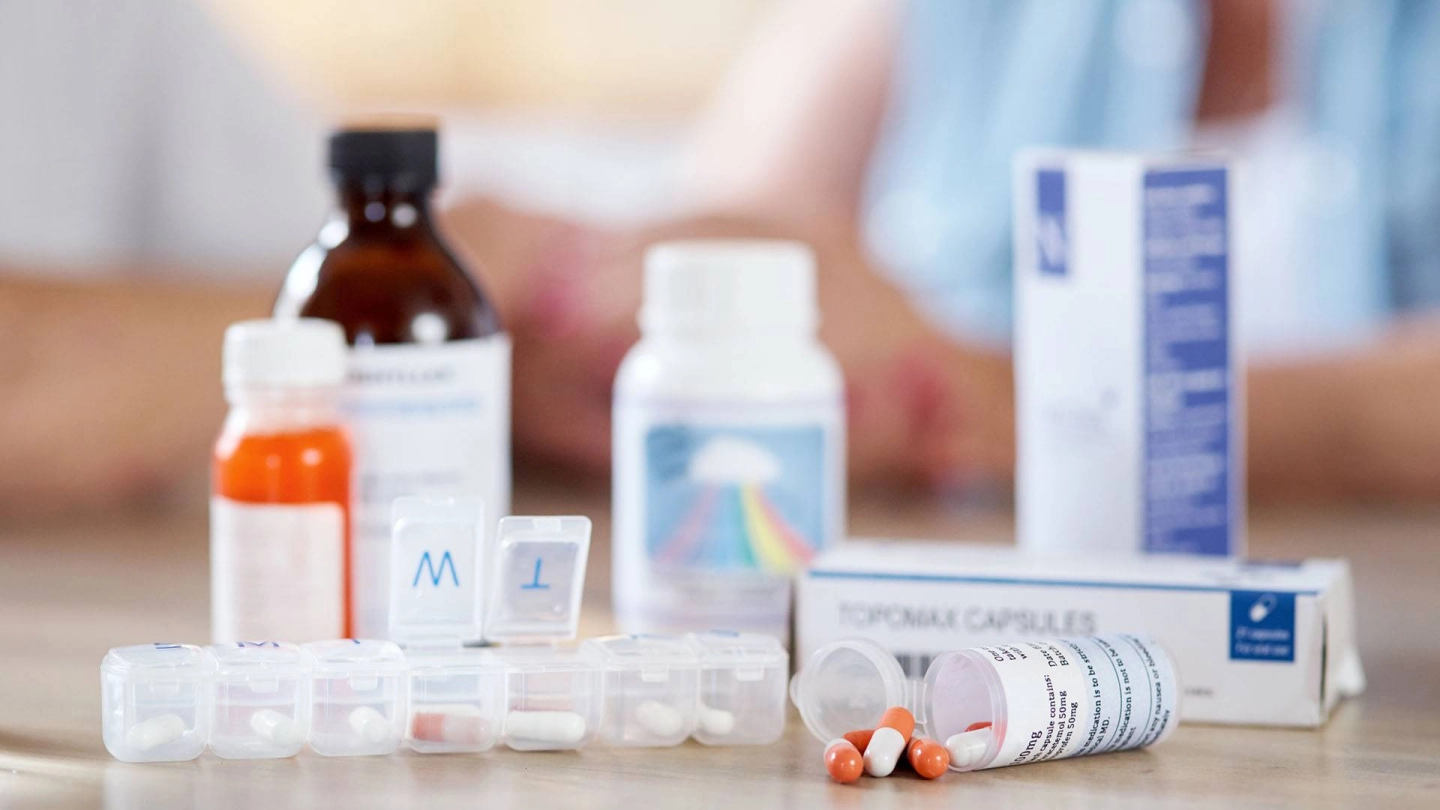Health care Medication – an overview
The purpose of medication is to prevent, treat, relieve or diagnose health conditions. Medication may contain active ingredients that are chemically manufactured or derived from biological materials.
At a glance
- Medication can be used to prevent, cure or relieve health conditions or as a means of diagnosing them.
- Most medication can only be purchased in a pharmacy and many types are only available with a prescription.
- The active agents in medication may be chemically manufactured, derived from human or animal biological material (biologics) or extracted from plants (herbal medicinal products).
- Generics and biosimilars copy original medicinal products after patent protection has expired. They have the same effect but cost less than the original product.
- Before medication can be sold on the market, it must normally be tested and approved. In some cases, registration is sufficient.

What is medication?
The purpose of medication – also known by a range of other terms such as medicinal products, drugs, pharmaceuticals, medicaments and medicines – is to treat, prevent, detect or relieve health conditions. Medication also includes diagnostics, medicinal fluids and solutions (infusions), homeopathic remedies and medicinal products prepared in a pharmacy.
Important: Medication does not include food, food supplements, cosmetic products, tobacco products, biocides or medical devices.
As well as medication with chemically manufactured active agents, there are also herbal medicinal products and biologics (biological products) derived from animal or human sources.
Both the development of new types of medication and the manufacturing of imitation products (generics) are important for the healthcare system. Generic products are free to be sold on the market once data exclusivity protection and patent protection of the original products have expired.
What is medication used for?
There are many different types of medication that are used for a wide range of medical purposes:
- to prevent diseases, e.g., vaccines
- to cure diseases, e.g., antibiotics to fight bacterial infections
- to relieve symptoms of an illness, e.g., anti-febrile medication to bring down a high temperature in a flu infection with fever
- to diagnose health conditions, e.g., contrast agents used in magnetic resonance imaging (MRI)
Some medication, such as antibiotics or anti-febrile medication, is normally only taken on a short-term basis for a few days. It relieves acute symptoms such as fever or promotes recovery in acute illnesses such as bacterial infections.
Other types of medication, such as diabetes medication or medication for high blood pressure, is intended for the long-term treatment of chronic illnesses and have to be taken regularly over an extended period or even for the remainder of the patient’s life.
Medication comes with a package insert explaining how it is to be taken and stored correctly. More information about taking, storing and disposing of medication is provided in the article discussing how to manage medication.
Where can medication be purchased/sold?
Most medication requires a prescription or can only be sold in a pharmacy. Prescription medication can only be purchased in a pharmacy with a medical prescription. Pharmacy drugs don’t require a prescription but can only be purchased in pharmacies.
Some types of medication can also be sold in retail settings other than pharmacies. These are known as over-the-counter (OTC) drugs or medication. They can be bought in drugstores, health stores and supermarkets, for example. However, the retailer must be able to demonstrate that they have the required specialist knowledge in this area. This is regulated by the Pharmaceutical Products Act (§ 50 AMG). Examples of over-the counter medication (OTC) include throat lozenges taken for coughs and hoarseness.
For more information about the purchase and sale of medication and about medication that can only be sold in a pharmacy, see the article Medication with or without a prescription.
What are herbal medicinal products?
Herbal medicinal products, also known as herbal remedies, are a type of medication in which the active agent is derived exclusively from plant-based substances, formulas or combinations. As with many other types of medication, the active ingredient is derived from plants rather than being chemically manufactured. Despite this, herbal medicinal products may still have side-effects or have interactions with other medication.
There are also traditional herbal products that have been used in medical applications for over 30 years.
What are homeopathic medicinal products?
Homeopathic medicinal products (or homeopathic medicines) are a type of medication prepared according to a homeopathic manufacturing procedure described in the European Pharmacopoeia or in one of the official homeopathic pharmacopoeias of the Member States. They may contain one or more basic materials known as homeopathic stocks. These are highly diluted in accordance with the rules specified in the pharmacopoeia. This is intended to increase the potency or effectiveness of the substance. Many homeopathic remedies are so highly diluted that they barely contain any stocks. Homeopathic medicinal products are frequently administered in the form of homeopathic globules, drops or tablets.
What are generics?
When a new pharmaceutical active agent is discovered or developed, the pharmaceutical company usually has it patented. A patent remains valid for 20 years. During this period, the company’s medicinal product is protected so that it cannot be copied and sold by other manufacturers (patent protection). In other words, the medicinal product can only be sold by the patent owner during this time. In addition, data about clinical trials that is submitted for the purpose of having a medicinal product approved cannot be used for other approvals for a certain period (data exclusivity protection).
When the data exclusivity protection and patent protection of the original product has expired, “generics” can be placed on the market following approval. In some cases, approval may be granted even before the data exclusivity protection has expired. Generics are medicinal products with the same active agent, same dosage form, same potency and dosage, as well as the same areas of application as the original product. To achieve approval, a pharmaceutical company must prove that its generic drug is comparable to the original product. For example, it must be absorbed by the body and excreted by the body in exactly the same way.
The benefit of generics is that they are much less expensive because the manufacturer is not required to invest money in clinical research and development. Generics also help reduce costs for health insurance funds, as these generally cover most of the costs of prescription medication for their members.
Important: Generics are just as safe and effective as the original products on which they are based. This is ensured by the fact that they are subject to the same rigorous quality standards.
What are biologics and biosimilars?
Biologics or biological medicinal products are a type of medication with active agents derived from biological substances, such as blood, tissue or cells. They contain, for example, proteins, nucleic acids, carbohydrates, cells or microorganisms. As a result, they exhibit a certain degree of natural variability and require particularly careful monitoring. Examples of biologics include clotting factors, antibodies and most vaccines.
Biosimilars are products that are very similar to biologics. Unlike generics, however, biosimilars are not identical to the active agent in the original product. They are instead very similar but equally effective.
How is medication regulated and approved?
The safety and efficacy of any medication must be scientifically proven before it is placed on the market. Clinical trials are often a prerequisite for approval. These trials test the efficacy and safety of the medication on volunteer test subjects.
In the case of many medicinal products, the trial data that is collected is reviewed by national authorities, such as the Federal Institute for Drugs and Medical Devices (BfArM) or the Paul Ehrlich Institute (PEI) in Germany.
Some are approved by the European Commission, coordinated by the European Medicines Agency (EMA). These include, for example, new active agents, medication to treat certain diseases (such as cancer) or products manufactured using special processes.
These are then approved for the entire European Union (EU) or the European Economic Area. This approval process is similarly carried out by scientists from the national authorities. This type of approval is known as the central approval process.
In Germany, responsibility for the monitoring of medication is shared among several bodies. The monitoring of side-effects is the responsibility of the higher federal authorities, i.e., BfArM and PEI. Monitoring of other aspects – such as manufacturing or marketing – is carried out by the federal states.
For more information about how medication is developed, tested in clinical trials and approved, refer to the article about the approval of medication.
Registration rather than approval
Homeopathic medicinal products without a specific area of application and traditional herbal medicinal products represent a special case in that they only require registration rather than approval. Clinical trials are not required. However, the safety of the product must still be proven.
If homeopathic medicinal products have a specific area of application, such as “febrile respiratory tract infections”, they require approval, i.e., registration is not sufficient.
Where can I find more information about medication?
More detailed information about medication is available from the Federal Institute for Drugs and Medical Devices (Bundesinstitut für Arzneimittel, BfArM) in the citizens’ information section of its website.
- Bundesinstitut für Arzneimittel und Medizinprodukte (BfArM). Allgemeine Fragen. Aufgerufen am 24.04.2025.
- Bundesinstitut für Arzneimittel und Medizinprodukte (BfArM). Arzneimittel. Aufgerufen am 24.04.2025.
- Bundesinstitut für Arzneimittel und Medizinprodukte (BfArM). Homöopathische Arzneimittel. Aufgerufen am 24.04.2025.
- Bundesinstitut für Arzneimittel und Medizinprodukte (BfArM). Zentralisiertes Verfahren. Aufgerufen am 24.04.2025.
- Bundesministerium für Gesundheit. Generika. Aufgerufen am 24.04.2025.
- Bundesministerium für Gesundheit. Zugang zu Arzneimitteln. Aufgerufen am 24.04.2025.
- Bundesministerium für Justiz. Gesetz über den Verkehr von Arzneimitteln (Arzneimittelgesetz). Stand: 23.10.2024.
- Gemeinsamer Bundesausschuss (G-BA). Biologika und Biosimilars: Austauschbarkeit von biotechnologisch hergestellten Arzneimitteln. Aufgerufen am 24.04.2025.
- Institut für Qualität und Wirtschaftlichkeit im Gesundheitswesen (IQWiG). gesundheitsinformation.de. Homöopathie. Aufgerufen am 24.04.2025.
- Paul-Ehrlich-Institut (PEI). Aufgaben. Aufgerufen am 24.04.2025.
In cooperation with the Federal Institute for Drugs and Medical Devices (BfArM).
As at:





